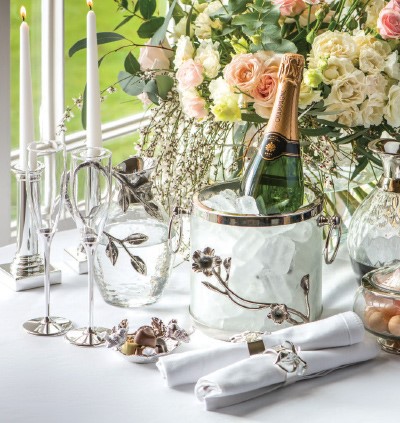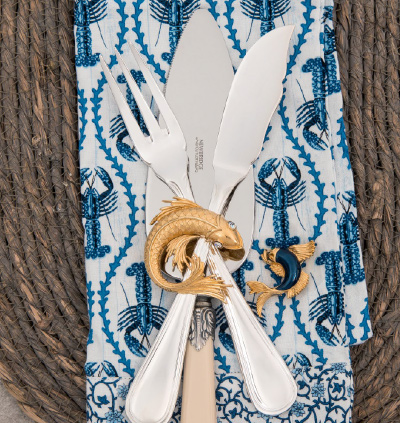Jewellery
Congratulations you are the owner of a superb piece of Newbridge Silverware which has been created to the highest standards of design and excellence.
All the products are individual and with a little care you can maintain the beauty and lustre of your piece.
Wearing Jewellery
- Jewellery should be put on last and taken off first when dressing.
- Care should be taken when removing jewellery to prevent catching in clothing.
- Contact with chemicals may cause corrosion of the surface. Jewellery should only be put on after you finish with hairspray, perfume, make-up, soaps and body lotions.
- Do not allow your jewellery to come into contact with bleaches or water containing chlorine.
- Hard contact, for example knocking against objects, could cause scratches, chips and other damage.
Storing Jewellery
- Keep your jewellery in the original packaging.
- Store your jewellery separately to avoid scratching.
Cleaning Jewellery
- As jewellery is sometimes delicate, cleaning should always be approached with care.
- Wearing jewellery inevitably gathers a build up of natural oils from the skin, polishing with a dry piece of cotton after wear will help maintain the original lustrous finish.
- Cleaning the item with an abrasive material or liquid jewellery dips will diminish the coating causing the acceleration of the tarnish process.
Watches
Congratulations you are the owner of a superb watch by Newbridge Silverware which has been created to the highest standards of design and excellence.
All the items are individually made and with a little care you can maintain the beauty and lustre of your piece.
Wearing Watches
- Watches should be put on last and taken off first when dressing.
- Care should be taken when removing watches to prevent catching in clothing.
- Contact with chemicals may cause corrosion of the surface. Watches should only be put on after you finish with hairspray, perfume, make- up, soaps and body lotions.
- Do not allow your watch to come into contact with bleaches or water containing chlorine.
- Hard contact, for example knocking against objects, could cause scratches, chips and other damage.
Storing Watches
- Keep your watches in the original packaging.
- Store your watches separately to avoid scratching.
Cleaning Watches
- As watches are sometimes delicate, cleaning should always be approached with care.
- Wearing watches inevitably gathers a build up of natural oils from the skin, polishing with a dry piece of cotton after wear will help maintain the original lustrous finish.
- Cleaning the item with an abrasive material or jewellery liquid dips will diminish the coating causing the acceleration of the tarnish process.
Failure to comply with the above guidelines could invalidate your warranty.
Diamond Care
Diamonds may be the hardest substance on earth, but they are not indestructible. While they can be cut or polished only by another diamond, a hard blow can cause them to chip. Never wear your diamond jewellery when doing rough work. When storing our diamond jewellery, be sure to keep it separate from other jewellery. Remember that diamonds cannot only scratch any other jewellery you have but can scratch each other too. It is recommended to have your diamond jewellery cleaned and inspected every six months.
- Clean your diamond regularly. A simple plan to keep your diamond jewellery always looking beautiful is to use a recommended jewellery cleaner or,
- A tiny drop of washing up liquid mixed with some warm water is all you need to create an effective soaking solution for your gold jewellery. Place the jewellery into this mixture and leave to soak for around 15 to 30 minutes before removing and wiping dry with a soft, clean cloth. Use a very soft brush to clean the prongs and general areas if there is any substantial product build up.
- You can use this soft brush to remove dirt that is lodged in between the prongs and the diamonds but be extra careful not to scratch the metal or move the positioning of a prong. If fibres from cloth get stuck in the setting, remove them carefully with a tweezers.
- Do not use harmful solutions. Chlorine or abrasives should never be used when cleaning diamonds, especially those set in jewellery. These erode some of the metals often used in diamond settings, and may loosen prongs, or even dissolve the metal completely.
Remove Diamond Jewellery When Applying Creams
- Whether it is your everyday moisturiser or special creams, do avoid wearing your jewellery while applying cream to ensure it does not get behind the diamond or between the prongs, causing build up and dullness. It is also a good idea to apply hairspray, make up and perfume before putting jewellery on because over time this can cause tarnish on the prongs, clasps and bands holding the diamond in place.
Insuring Your Diamond Jewellery
- Following the purchase of your diamond jewellery, it is recommended you insure your valuable items in the event of loss or theft. It is advisable to contact your home insurers for advice regarding the addition of your jewellery to your insurance policy. They will provide you full guidance and based upon your jewellery details, they may advise of an additional policy or, adding to your existing policy.
- If you choose to get additional insurance, understand if a deductible applies and how much it is. Most insurance companies will not insure fine jewellery without a valuation certificate, and which is included with your purchase documentation. Ensure you read and understand your policy details and level of cover in place or in the event of additional insurance.
- When you invest in diamond jewellery, you want to make sure that your investment is protected.





